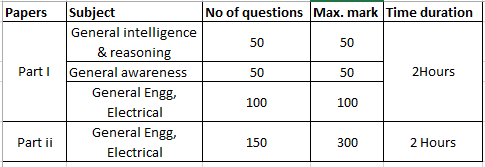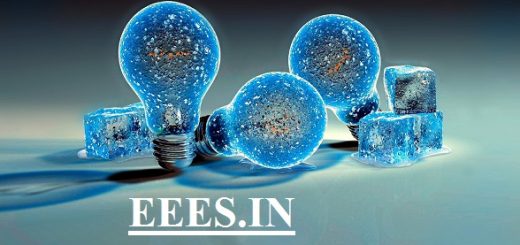SSC JE Electrical Tier-1 Exam Date Out
SSC Junior Engineer ( Electrical ) Examination (Paper-I) 2019-20, has been scheduled to commence from 1st September to 4th September 2020. Earlier, the exam was scheduled from 30th March to 2nd April 2020 but had been postponed due to Novel Coronavirus (COVID-19) outbreak in India. Candidates are advised to visit this page regularly for latest updates.
Scheme of SSC JE Electrical Examination

Part I : i) General intelligence & reasoning :
The Syllabus for General Intelligence would include questions of both verbal and non-verbal type. The test may include questions on analogies, similarities, differences, space visualization, problem solving, analysis, judgement, decision making, visual memory, discrimination, observation, relationship concepts, arithmetical reasoning, verbal and figure classification, arithmetical number series etc. The test will also include questions, relationships, arithmetical computations and other analytical functions.
ii) General awareness : Questions will be aimed at testing the candidate’s general awareness of the environment around him/her and its application to society. Questions will also be designed to test knowledge of current events and of such matters of everyday observations and experience in their scientific aspect as may be expected of any educated person. The test will also include questions relating to India and its neighbouring countries especially pertaining to History, Culture, Geography, Economic Scene, General Polity and Scientific Research, etc. These questions will be such that they do not require a special study of any discipline.
iii) General Engineering :
Basic concepts, Circuit law, Magnetic Circuit, AC Fundamentals, Measurement and Measuring instruments, Electrical Machines, Fractional Kilowatt Motors and single phase induction Motors, Synchronous Machines, Generation, Transmission and Distribution, Estimation and Costing,Utilization and Electrical Energy, Basic Electronics.
Part II BASIC ENGINEERING (300 marks)
Basic concept : Concepts of resistance, inductance, capacitance, and various factors affecting them. Concepts of current, voltage, power, energy and their units.
Circuit Law : Kirchhoff’s law, Simple Circuit solution using network theorems
Magntism : : Concepts of flux, mmf, reluctance, Different kinds of magnetic materials, Magnetic calculations for conductors of different configuration e.g. straight, circular, solenoidal, etc. Electromagnetic induction, self and mutual induction.
AC fundamentals : Instantaneous , peak, rms,average alternating waves, Representation of sinusoidal wave form, simple series and parallel AC Circuits consisting of R.L. and C, Resonance, Tank Circuit. Poly Phase system – star and delta connection, 3 phase power, DC and sinusoidal response of R-Land R-C circuit.
Measurement and Measuring instruments,:
Measurement of power (1 phase and 3 phase, both active and re-active) and energy, 2 wattmeter method of 3 phase power measurement. Measurement of (both moving oil and moving iron type), extension of range wattmeter, Multimeters, Megger, Energy meter AC Bridges. Use of CRO, Signal Generator, CT, PT and their uses. Earth Fault detection. Electrical Machines
Electrical Machines :
Basic electro magnetic laws- EMF generation in a rotating machine- production of torque-concepts of electric machines- common features of electric machines- types of electrical machines- torque balance- power losses and efficiency- methods of ventilation and cooling machines. Principle and working of a practical generator and construction details- commutator assembly-emf equation- classification of generators based on methods of excitations, Armature windings-equalizer connections.Armature reaction- effects- commutation- methods of improving commutation. Generator characteristics . critical field resistance and critical speed- uses of DC generators.DC motor principle- back emf- voltage equation- torque equation- Types of motors- motor characteristics for DC shunt, series and compound motors. Factors controlling motor speed-methods of speed control of shunt, series and compound motors. Starting of DC motors- Starters Types and necessity.Testing of DC motors- losses in DC machines- determination of efficiency- Swineborne test-advantages and disadvantages.Synchronous generator-characteristics and parallel operation of alternators-voltage regulation-synchronous motors -single phase induction motors -fractional horse power motors-transformer principle-testing of transformers-special purpose transformers-principles of induction motors-speed control of induction motors-theory of measuring instrument-measurement of power and energy-measurement of R,L,C-commercial measuring instrument-CRO and transducers
Generation, Transmission & Distribution :
Electrical power generation-economic power-power factor improvement-transmission line elements-underground cables-sag in transmission lines-distribution system(ac and dc) Short circuit current calculation and fuses-circuit breakers-relays-protection of alternators, transformers, transmission line- earthing and lightning arresters
Estimation and Costing
Estimation of lighting scheme, electric installation of machines and relevant IE rules. Earthing practices and IE Rules
Utilization and Electrical Energy
Illumination, Electric heating, Electric welding, Electroplating, Electric drives and motors.
Basic Electronics.
Working of various electronic devices e.g. P N Junction diodes, Transistors (NPN and PNP type), BJT and JFET. Simple circuits using these devices.


Recent Comments